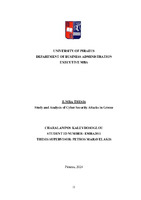Study and analysis of cyber security attacks in Greece

Master Thesis
Author
Kalevrosoglou, Charalampos
Καλευρόσογλου, Χαράλαμπος
Date
2024View/
Keywords
Cybersecurity ; Cyber threats ; Ransomware ; Greece ; Time series analysis ; Arima modelsAbstract
This study focuses on examining the trends and types of cyber threats facing businesses
across various industries. It explores how the rapid digitization of enterprises has
expanded the attack surface, making businesses vulnerable to cyber incidents such as
ransomware, phishing, and distributed denial of service (DDoS) attacks. By analyzing
the patterns of cyberattacks across industries like healthcare, finance, retail, and public
sectors, the study provides insights into how the frequency of attacks has increased over
time.
A key finding of the study is the identification of increasing cyber threats in critical sectors,
particularly healthcare and financial services. These sectors, due to their handling of
sensitive information, have become major targets for ransomware and phishing attacks.
The study emphasizes the role of technological advancements in exacerbating the
vulnerabilities in these industries, pointing out that while digital transformation brings
efficiency, it also opens up new channels for cybercriminals.
The research employs a time series trend analysis to identify fluctuations in attack
frequency over a multi-year period. This analysis reveals that cyberattacks follow certain
periodic patterns, with seasonal spikes observed in sectors like retail during busy periods
such as holiday shopping seasons. It also notes that public sector organizations,
especially governmental bodies, have experienced a rise in ransomware incidents,
raising concerns about the adequacy of existing cybersecurity measures in safeguarding
critical infrastructure.
Another critical outcome of the study is its emphasis on the need for businesses to adopt
more robust cybersecurity strategies, including regular updates to security protocols,
investment in employee training, and improved incident response plans. The findings
highlight how organizations that have implemented comprehensive security frameworks
are better able to mitigate the damage caused by cyberattacks.


